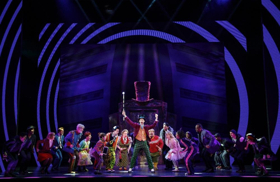Review: CHARLIE AND THE CHOCOLATE FACTORY a Sour Adaptation

A world of pure imagination, sprinkled with a willing suspension of disbelief, yet riddled with incongruities - welcome to Charlie and the Chocolate Factory, the stage musical adaptation of Roald Dahl's 1964 book of the same name.
Since its publishing in 1964, the children's novel has taken on many forms, including stage, television, and film adaptations. The most popular adaptation is the 1971 cult classic film, Willy Wonka and the Chocolate Factory starring Gene Wilder.
With some songs from the film, the stage musical is a familiar journey for audiences. Willy Wonka hides five golden tickets in his chocolate bars, and children around the world scramble to unwrap one of them. With these tickets, the children are granted admission to Wonka's factory - a factory of his creation, which defies explanation.
Unfortunately, that's where the similarities end and the discrepancies begin. As with any adaptation, changes are inevitable and expected; an adaptation gives its new author a chance to extend the magic of the content and even correct the mistakes of the original author. However, Charlie and the Chocolate Factory complicates the relationship with the audience and leaves more questions where no questions were before.
Let's begin with the inconsistencies of the Bucket family: Charlie Bucket (Henry Boshart) comes from a poor family. He yearns for the chance to buy just one chocolate bar for the chance at a golden ticket, but his family does not have enough money to purchase one for him, save his birthday. Instead, Charlie is tasked daily with purchasing rotten cabbage for less than ten cents. For a family of six, this allowance seems far from believable.
Charlie's mother (Amanda Rose) wears patchwork clothing, but her bright green blouse seems contradictory to the drab colors in her house and worn by her other family members. Her hair is lush and Pantene commercial worthy. Again this is a discrepancy with the socioeconomic status of the family that is distracting enough to be memorable by this audience member.
As is common with many of my grievances with the show, little to none are because of the actors, but rather because of the choices made by the production staff and creative team.
The era of the show is also perplexing. The Bucket family looks more consistent with the timeframe of the movie, Mrs. Teavee (Madeleine Doherty) wears attire of the 50s, and and Mr. Beauregarde (David Samuel) records his daughter on his smartphone. Even before stepping into the chocolate factory, audience members are being asked to suspend their disbelief to an extraordinary level.
Once in the factory during Act Two, the magic and whimsy of the storyline is lost to cheap sets and expensive projections. The grand reveal of the inside of the chocolate factory, an integral part of the movie and a scene that has great potential on stage, is an utter let down. A couple candy flowers and a giraffe that can produce adult beverages sparsely populate the stage.
On that note, Charlie and the Chocolate Factory also struggles to identify its audience. What seems to be a kids show is derailed in multiple scenes: morose jokes about their deaths by Charlie's grandparents, drugs and liquor in a song by Mrs. Teavee, and a macabre dismemberment of one of the naughty children in the factory. (To be honest, I did enjoy that last one perhaps more than I should have.)
But I digress. The show did have good qualities and traits as well. For example, Charlie Bucket is just as sweet as he is in the movie and is very easy to adore. Vocally, the show was where it should be. The dancing was adequate by members of the cast, tall and short.
If you like reading, you will go far...because you have just reached to the final section of the review: the Oompa Loompas. Yes, the small creatures that work in Willy Wonka's factory to produce the delicious candies.
Contrary to the 1971 movie, an illustrious use of puppetry was used to portray the characters. It's hard to describe how the actors controlled the puppets with their hands and knees, but the puppetry design and execution is laudable.
Oompa Loompa doo-pa-dee-doo, despite questionable storytelling and unmemorable songs (other than those from the movie), Charlie and the Chocolate Factory is an excuse to take refuge from the cold weather plaguing Pittsburgh this week.
To see or not to see score: 4/9; Moderately Disapproved Show
Photo by: Madigan Greiner
Reader Reviews
Videos

